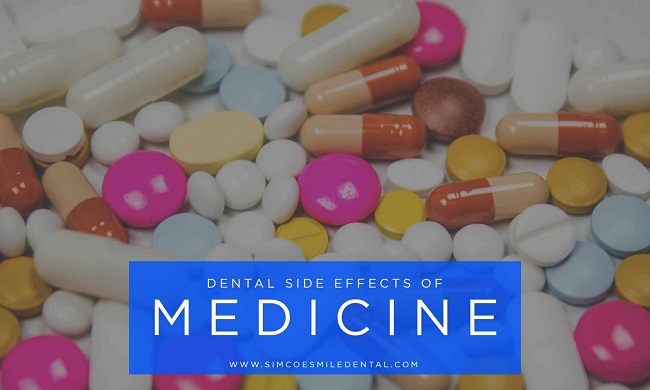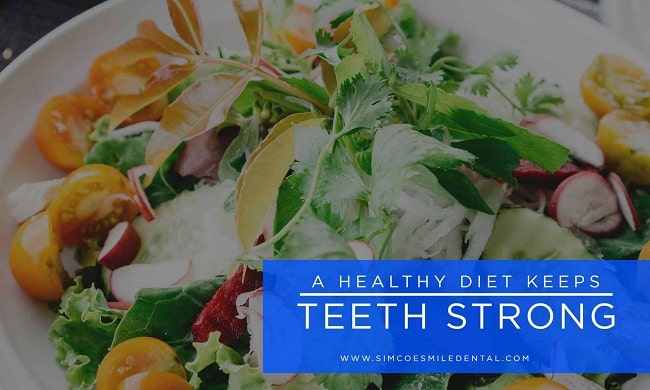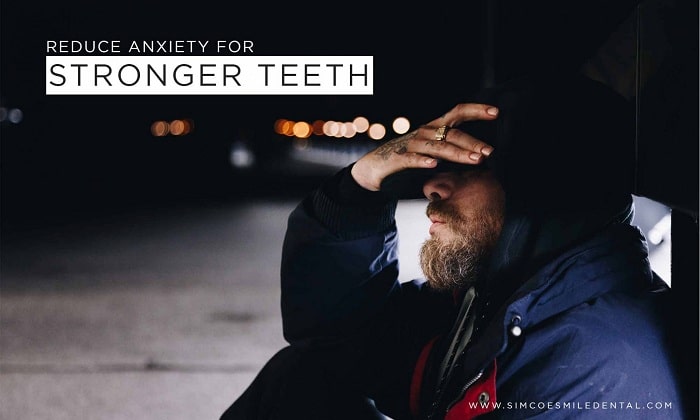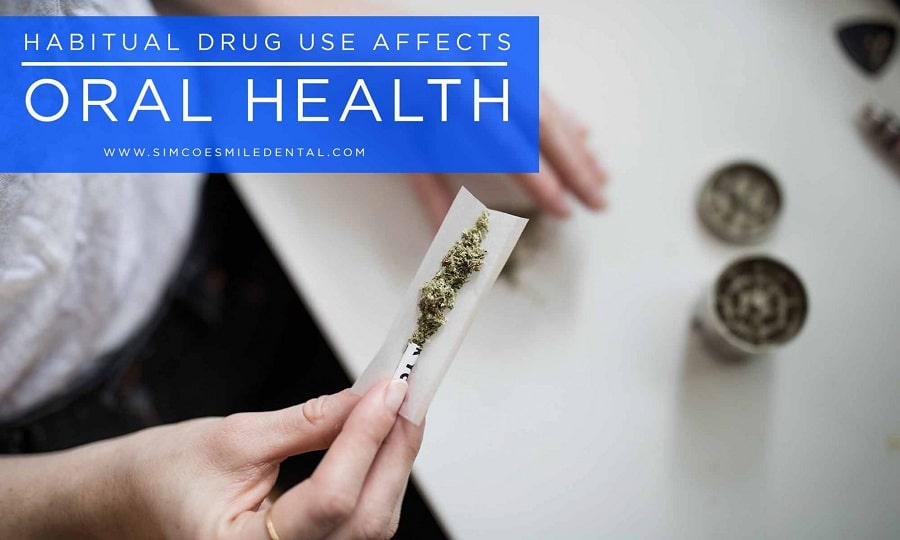There is a connection between oral health and your overall well-being. To improve both, there are certain lifestyle changes to consider. Learn how your everyday routine, your eating habits, and your patterns can affect how your mouth looks and feels.

Medications such as antihistamines, painkillers, antidepressants, decongestants, and diuretics may reduce saliva flow. Saliva helps wash away food left in the mouth and neutralizes acids that the bacteria in your mouth produces. This helps protect against a microbial invasion that can lead to the development of certain diseases and infections. Talk to your doctor about possible medical side effects and how your oral health affects your other conditions.
Prescription Drugs
Doctors prescribe certain drugs to help patients, but some may have serious side effects, altering the health of teeth, gums, and tongue. Some examples of oral side effects from prescription drugs are:
- Xerostomia from antihistiamine use.
- Tooth decay from cough syrup high sugar content.
- Dissolved tooth enamel from frequent need for asthma inhalers.
- Damaged gums can result from oral contraceptives, antihistamines, chemotherapy, and immunosuppressive drugs.
Some serious diseases (like HIV/AIDS and diabetes) may lower the body’s ability to fight infection, making it even more important to take care of your oral health.
Managing the Bacteria
Like some other parts of the body, your mouth contains bacteria. While most are harmless, others can cause serious damage. Normally, the body’s natural defenses coupled with good oral hygiene (e.g. daily brushing and flossing) can keep the bacteria population under control. However, dismissing these hygienic necessities can allow bacteria to multiply in your mouth and cause infection, tooth decay, and gum disease.
Making necessary changes to your lifestyle by adopting good habits (and eliminating bad ones) can improve your overall health. Some lifestyle changes you may want to embrace are:
- Practicing good hygiene
- Being more active
- Eating a balanced diet
- Avoiding risky behaviours (e.g. excessive alcohol consumption, smoking, etc.)
- Learning healthy ways to cope with stress
- Keeping your regular dental appointments religiously
Diet
Your dietary habits may seriously effect your dental health. Consider curtailing your consumption of certain foods and beverages:
- High Sugar
Sugar consumption contributes to tooth decay and gum disease. The bacteria present in your mouth love sugar, devouring it to produce acids that weaken the enamel on your teeth. The wearing down of this protective layer can cause the entire tooth to decay. As a result, you may lose teeth or need several cavities filled. - Alcohol and Cocktails
Saliva plays an important role in the maintenance of your oral health including controlling the acidity and pH level of your mouth, washing out food debris, keeping the soft tissues of the mouth healthy, and lubricating the oral cavity. It also limits the growth of bacteria in your mouth. Consuming too much alcohol can cause xerostomia (dry mouth) and decrease your saliva production. Too little saliva can encourage plaque growth, gum disease, tooth loss, and decay. Having a dry mouth can also cause tongue irritations and difficulties swallowing. - Caffeine
Just like alcoholic drinks, caffeine causes the natural bacteria that grow in your mouth to produce acids that are harmful to teeth. If these acids aren’t immediately cleaned, they can damage enamel, leaving teeth vulnerable to decay and, potentially, eventual tooth loss.
Among other factors that can negatively affect your health, stress, recreational drug use, oral piercings, and smoking are huge considerations. Read on to learn how they harm your mouth and body, and how moderation (and control of anxiety) is key to overall wellness.
Stress
The effects of stress on teeth are not easily detectable, but psychological tension can affect your mouth the same way affects the rest of your body. Stress can have serious consequences on both your oral and overall health.
Too much stress can influence people to neglect their dental health. They may forget to brush or floss as often as they need, or miss a dental checkup or two. People experiencing severe stress and anxiety are also more likely to consume alcohol, eat sugary food, and smoke — all of which can lead to tooth decay, gum disease, and oral cancer.
Stress can also lead to:
- Temporomandibular disorder (TMD), which affects the joints of jaws and muscles that help us chew, speak, swallow, and yawn. Symptoms of TMD include headaches, issues with opening or closing your mouth, and soreness in the jaw muscles.
Teeth grinding (bruxism) is a condition where people grind teeth in their sleep, or when under pressure. Over long periods of time, bruxism can wear the surfaces of teeth, causing them to become painful, loose, or susceptible to fractures.
Xerostomia (dry mouth) (as mentioned before) this develops from drinking too much alcohol or caffeine, or ingesting some anti-depressants.
Recreational Drugs
Aside from the obvious psychological and physiological effects of recreational drugs, they can have repercussions on your oral health. The following recreational drugs have can cause specific physical harm:
- Ecstasy. This drug can raise body temperature and cause the user to crave cool and sugary drinks. Heroin and marijuana can also cause “munchies” and sugar cravings.
- Methamphetamines, nicotine, amphetamines (and ecstasy). All these drugs can cause the capillaries in gums to constrict and adversely affect the attachment of mouth/teeth tissues to bone. This can eventually lead to tooth loss.
- Heroin, (and marijuana, amphetamines, methamphetamines, ecstasy). These affect the production of saliva that puts people at risk for many oral diseases.
Piercing the Tongue, Lips, Cheek
Oral piercings are an interesting expression of individuality, but it’s recently been discovered they may cause health complications, including:
-
- Infection from bacteria in the mouth
- Chipped or cracked teeth
- Pierced blood vessel, leading to uncontrollable bleeding
Pain, swelling, or damage to gum tissue
Tobacco Use
All types of tobacco (cigarettes, cigars, and smokeless tobacco) are harmful to teeth. Try to reduce your tobacco consumption to avoid:
- Periodontal disease
- Teeth stains
- Bad breath
- Tooth loss
- Cancers of the lungs, esophagus, voice box
- Oral cancer
Symptoms of Oral Health Issues
Like all health problems, the sooner oral health difficulties are detected, the easier they are to treat, control, and cure. See your dentist if you witness any of the following signs:
Gum Disease
- Consistent bad breath despite good oral hygiene
- Bleeding when brushing or flossing
- Red, puffy, inflamed, or sensitive gums
Oral Cancer
- Sores in your mouth that won’t go away
- Lumps or thickening on the sides or bottom of your tongue, cheeks, or on the roof of your mouth
- Numbness or tingling
Regular visits to the dentist will allow early detection of symptoms and other health problems. If you have any complications or pain in your mouth, immediately call your dentist. Make sure to see your General Physician at least once a year and get regular dental cleanings twice every 12 months.
If you are in need of a dentist in Oshawa to keep your teeth and gums in top shape, call Simcoe Smile Dental. Make an appointment with us at (289) 312-1482. Our staff of dental professionals will take good care of you and your family. The services we offer include cosmetic dentistry, teeth whitening, and more.






